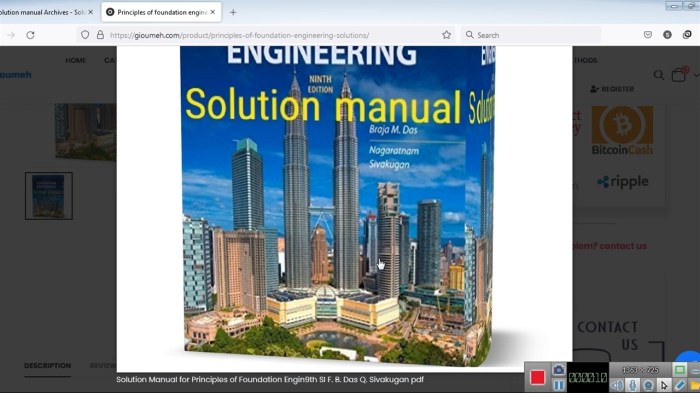Principles of geotechnical engineering 9th edition – Embarking on a journey through the principles of geotechnical engineering, this 9th edition unveils the intricacies of soil mechanics and geotechnical design, providing a comprehensive understanding of the field’s fundamental concepts and practical applications.
Delving into the complexities of soil behavior, soil classification, and soil compaction, this edition equips readers with the knowledge to analyze soil properties, determine soil strength and compressibility, and design geotechnical structures that can withstand the challenges of varying soil conditions.
Principles of Soil Mechanics

Soil mechanics is the branch of geotechnical engineering that deals with the behavior of soil under stress. It is a complex subject that involves the study of soil properties, soil behavior, and soil-structure interaction.
One of the most important concepts in soil mechanics is the concept of effective stress. Effective stress is the stress that is acting on the soil particles, and it is the stress that is responsible for the soil’s behavior. Effective stress is calculated by subtracting the pore water pressure from the total stress.
Soil Behavior under Different Stress Conditions
The behavior of soil under stress depends on a number of factors, including the soil type, the density of the soil, and the stress history of the soil.
- Dense soilsare less compressible and more shear resistant than loose soils.
- Stressesthat have been applied to a soil in the past can have a significant impact on its behavior under future stresses.
Methods Used to Determine Soil Strength and Compressibility
There are a number of different methods that can be used to determine the strength and compressibility of soil. These methods include:
- Laboratory tests, such as the triaxial test and the consolidation test
- Field tests, such as the standard penetration test and the cone penetration test
Soil Classification and Properties
Soil classification is the process of dividing soil into different groups based on their properties. The most common soil classification system is the Unified Soil Classification System (USCS). The USCS classifies soils into 15 different groups, based on their grain size distribution, plasticity, and organic content.
The engineering properties of soils are the properties that are important for geotechnical engineering design. These properties include:
- Grain size distribution
- Plasticity
- Permeability
Factors That Influence Soil Properties
The properties of soil are influenced by a number of factors, including:
- The type of soil
- The density of the soil
- The stress history of the soil
- The environmental conditions
Soil Compaction and Consolidation
Soil compaction is the process of increasing the density of soil by applying a force to it. Soil compaction is often used to improve the strength and stability of soil.
Soil consolidation is the process of reducing the volume of soil by applying a load to it. Soil consolidation is often used to improve the bearing capacity of soil.
Principles of Soil Compaction
The principles of soil compaction are:
- The density of soil increases as the force applied to it increases.
- The amount of compaction that can be achieved depends on the type of soil and the moisture content of the soil.
- Compaction can be achieved by a variety of methods, including rolling, tamping, and vibrating.
Factors That Influence Soil Consolidation
The factors that influence soil consolidation are:
- The type of soil
- The density of the soil
- The stress history of the soil
- The duration of the load
Shear Strength of Soils
The shear strength of soil is the resistance of soil to shear forces. Shear forces are forces that cause soil to slide past each other.
The shear strength of soil is important for geotechnical engineering design because it is used to determine the bearing capacity of soil and the stability of slopes.
Types of Shear Strength Tests, Principles of geotechnical engineering 9th edition
There are a number of different types of shear strength tests that can be used to determine the shear strength of soil. These tests include:
- Direct shear test
- Triaxial test
- Vane shear test
Factors That Influence Soil Shear Strength
The factors that influence soil shear strength are:
- The type of soil
- The density of the soil
- The stress history of the soil
- The moisture content of the soil
Mohr-Coulomb Failure Criterion
The Mohr-Coulomb failure criterion is a mathematical model that is used to predict the shear strength of soil. The Mohr-Coulomb failure criterion is based on the following equation:“`τ = c + σ tan φ“`where:* τ is the shear strength of soil
- c is the cohesion of soil
- σ is the normal stress on the soil
- φ is the angle of internal friction of soil
Questions Often Asked: Principles Of Geotechnical Engineering 9th Edition
What are the key concepts of effective stress in soil mechanics?
Effective stress is the stress that governs the behavior of soil particles and is calculated by subtracting pore water pressure from the total stress.
How is soil strength determined?
Soil strength is determined through laboratory testing, such as shear strength tests, which measure the resistance of soil to deformation under applied shear stress.
What factors influence soil consolidation?
Soil consolidation is influenced by factors such as soil type, density, stress history, and drainage conditions.
What is the Mohr-Coulomb failure criterion?
The Mohr-Coulomb failure criterion is a mathematical model that describes the shear strength of soil based on its internal friction angle and cohesion.
How is slope stability analyzed?
Slope stability analysis involves assessing the potential for slope failure and is conducted using methods such as limit equilibrium methods and numerical modeling.